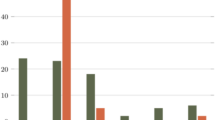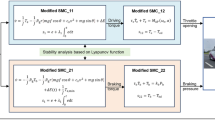Abstract
A stochastic sliding-mode variable structure guidance law involving optimal control theory is presented for the missile target intercept model, in which state noise, uncertain system parameters, target movement and measured noise are considered. This guidance law synthesizes the merits of optimal guidance law with line-of-sight rate convergence and sliding-mode guidance law with strong robustness. Through theoretic analysis, it is proved that the sliding mode hyperplane is sub-achievable in the closed loop system. The numerical results show the effectiveness of the proposed control algorithm.
Similar content being viewed by others
References
M. Mehrandezh. Robotic interception of moving object using an augmented ideal proportional navigation guidance technique. IEEE Transactions on Systems, Man, and Cybernetics, 2000, 30(3): 231–244.
H. Ma, Q. Fang, J. Yuan. Study of terminal guidance laws for space intercept. Flight Dynamics, 2006, 24(1): 52–54.
H. Zhang, F. Meng, L. Wang. Research of combined terminal guidance law and its simulations. Fire Control and Command Control, 2003, 28(1): 33–36.
C. S. Shieh. Tunable H∞ robust guidance law for homing missiles. IEE Proceedings - Control Theory Application, 2004, 151(1): 103–107.
H. Chen, C. Yang. Nonlinear H∞ robust guidance law for homing missiles. Journal of Guidance, Control, and Dynamics, 1998, 21(6): 882–890.
F. Zhou, J. Guo, J. Zhou. Guidance law design based on extended siding mode control. Journal of Northwestern Polytechnical University, 2005, 23(2): 249–252.
M. Shen, L. Chen, R. Wu, et al. The robust optimal guidance law based on LQR/SMVS. Aerospace Control, 2006, 24(1): 49–51.
D. Zhou, C. Mu, Q. Ling, et al. Optimal sliding-mode guidance of a homing-missile. Proceedings of the 38th Conference on Decision and Control. Piscataway: IEEE, 1999: 5131–5136.
Y. Liu, F. Deng. Variable Structure Control of Stochastic Systems. Guangzhou: South China University of Technology Press, 1998.
Q. Luo, F. Deng, Y. Song, et al. Variable structure control of stochastic systems represented by partial differential equation. Journal ofWuhan University of Science & Technology (Natural Science Edition), 2004, 27(2): 217–220.
Q. Li, J. Song. Filter design for strapdown homing guidance system. Acta Armamentar - II, 2005, 26(2): 215–219.
S. E. Talole, A. Ghosh, S. B. Phadke. Proportional navigation guidance using predictive and time delay control. Control Engineering Practice, 2006, 14(12): 1445–1453.
U. Shaked, C. Souza. Robust minimum variance filtering. IEEE Transactions on Signal Processing, 1995, 43(11): 2474–2483.
Y. Fang. Optimal Control for Stochastic System. Beijing: Tsinghua University Press, 2005.
Author information
Authors and Affiliations
Corresponding author
Additional information
This work was supported by the National Natural Science Foundation of China (No. 60674031), and the Doctorate Foundation of the Engineering College, Air Force Engineering University (No. BC07004).
Hongqiang WANG was born in Qinhuangdao, Hebei, China, in 1980. He received his Ph.D. degree from the PLA Air Force Engineering University in 2009, and he is currently a lecturer of PLA 95997 Unit Electronic Department. His research interests are mainly in stochastic optimal control theory, and missile guidance and control.
Daiqiang CAO was born in Lanzhou, Gansu, China, in 1975. He graduated from PLA Air Force Engineering University Engineering College in 1997, in Aviation Weapon Systems. He is currently Director of PLA 95997 Unit Electronic Department, and his research interests are mainly in avionics and aviation control theory.
Xudong WANG was born in Beijing, China, in 1973. He received his B.S. degree from National Defense Science and Technology University in 1996. He is currently a lecturer of PLA 95997 Unit Electronic Department, and his research interests are mainly in avionics and virtual reality technology.
Rights and permissions
About this article
Cite this article
Wang, H., Cao, D. & Wang, X. The stochastic sliding mode variable structure guidance laws based on optimal control theory. J. Control Theory Appl. 11, 86–91 (2013). https://doi.org/10.1007/s11768-013-1031-4
Received:
Revised:
Published:
Issue Date:
DOI: https://doi.org/10.1007/s11768-013-1031-4




